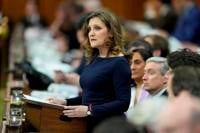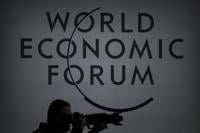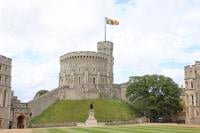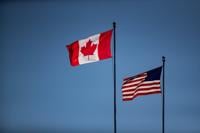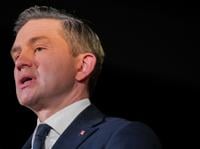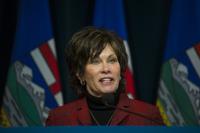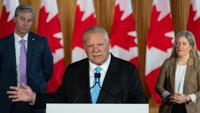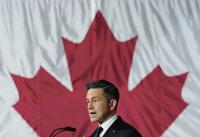The federal Liberal government is exploring new measures to expand access to halal mortgages, a form of Islamic financing that prohibits loans that charge interest. Some social media posts claim Prime Minister Justin Trudeau is introducing these types of mortgage options, halal mortgages are a form of preferential treatment for Muslims and individuals who wish to access these types of mortgages must convert to Islam. These claims are misleading. Halal mortgages have been available in Canada in some form for decades, they are available to anyone regardless of race or spiritual beliefs, and while halal mortgages don't charge interest, they use different legal and payment structures that can make the overall costs higher than conventional mortgages.
One user on X, formerly known as Twitter, , "I don't know much what the Muslim world offers through it's practices and had openly assumed - due to grocery store sections - that this was a dietary practice. Nope...as it turns out, if you renounce bacon and Convert to Islam, there are some pretty decent perks." The user went on to , "Trudeau and the Liberals, still supported by the NDP...will look to make these homes more affordable to Muslims."
Another user on X , "Justin Trudeau to introduce 'HALAL MORTGAGES' Where Muslims won't have to pay any interest on their home mortgage loans. How is this fair?"
At the time of publication, that post had one million views and had been reposted 2,500 times.
Rating: Misleading
As part of the , the federal government committed to looking at ways to make home ownership more accessible for ºÚÁϳԹÏÍøs and people living in Canada.
Part of this includes exploring new measures to expand access to alternative financing products, such as halal mortgages. The federal government said this could include changes in the tax treatment of these products or a new regulatory sandbox for financing services providers, while ensuring adequate consumer protections are in place.
The it recognizes Canada is home to a "vibrant and growing market of alternative financing products" and began consultations last month with financial services providers and diverse communities to understand how federal policies can better support the needs of all ºÚÁϳԹÏÍøs seeking to become homeowners.
An update is set to be included in this year's fall economic statement.
While halal mortgages were included as a way to make home ownership more accessible for a segment of the population, Trudeau has not introduced them.
These types of mortgages are not new to Canada. Experts who spoke to ºÚÁϳԹÏÍø said these loans have been around since the '80s.
"The only thing the Liberal government has proposed is how can we make a level playing field so everybody is treated fairly," said Walid Hejazi, professor of economic analysis and policy at the University of Toronto's Rotman School of Management.
What is a halal mortgage
Halal is an Arabic word that translates to "permissible" or "allowed" in the English language.
Halal financial products need to comply with certain rules in Islam. Under Islamic law, interest or riba is not allowed. An article from ºÚÁϳԹÏÍø said broadly speaking, halal finance means a person can't pay or receive interest.
Islamic finance is viewed as ethical because the Islam faith believes the borrower should not be at a disadvantage compared with the lender, said Syed Zuhair Naqvi, founder and CEO of Islamic mortgage provider Eqraz Inc.
These types of mortgages are consistent with Islamic financing principles, but are ultimately subject to ºÚÁϳԹÏÍø law like any other financial product or service.
"Interest free doesn't mean profit free," said Mohamad Sawwaf, founder and CEO of financial services firm Manzil.
"It really comes down to the process of documentation because the outcome is exactly the same."
Instead of an interest rate, a halal lender may charge a "profit rate," which experts say amounts to four to 10 per cent more than people who get a conventional mortgage.
"Banks consider it to be more risky when the market is so small, so they want more premiums to overcome that risk," Naqvi said.
Higher costs are due to a number of factors, including legal fees and a lack of providers. Customers also aren't eligible for the first time homebuyers credit and are in some cases subject to double the amount of land transfer taxes.
Currently, big banks don't off these mortgages, so smaller companies are trying to generate enough capital to finance halal mortgages. Smaller startups don't have the same "economies of scale" as big banks, meaning they have to charge more, Hejazi said.
There are three different types of halal mortgages with each having a different structure and method of transfer of ownership. The one most commonly used in Canada is called . With this type of agreement the lender buys the property and immediately sells it to the customer at a higher price that includes a profit. In these cases the lender and the customer are both charged a land transfer tax.
Experts say defaulting on payments goes against Islamic beliefs. Halal companies will work with customers to find an appropriate solution, which may include the lender selling the house to recover their money and giving the rest back to the borrower.
Islam does not allow for compound interest. Any profit earned from late payment charges must be donated to charity.
Who is eligible
Anyone who wants to get one of these mortgages is eligible, following the same approval process as conventional mortgages.
"The fact that someone's a Muslim or a non-Muslim is completely irrelevant, and it would be discriminatory if it was only offered to one group," Hejazi said.
Places outside Canada have seen success in offering halal mortgages to non-Muslims. In the United Kingdom, approximately 40 per cent of halal mortgages are held by non-Muslims, Hejazi said.
However, because of the shortage of halal financing options in Canada there is a long wait-list for those wishing to access halal mortgages.
Hejazi said changes need to be made to the current regulatory and tax system to make halal mortgages comparable to conventional mortgages.
Sawwaf and Naqvi would like to see some political pressure put on the Canada Mortgage and Housing Corporation to work with halal finance companies.
Sources
Social media claims can be found on X (), () and ()
()
Halal Finance Options Have Expanded in Recent Years, But Demand Outstrips Supply – ºÚÁϳԹÏÍø ()
()
About ºÚÁϳԹÏÍø Press fact checks
You can find out more about ºÚÁϳԹÏÍø here and about ºÚÁϳԹÏÍø Press Fact Checks here. To reach our fact-checking team with any tips, corrections or comments, please email us at cpfactcheck@thecanadianpress.com.


